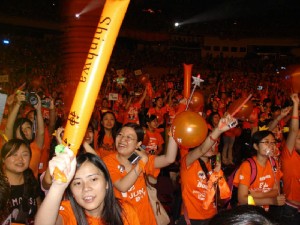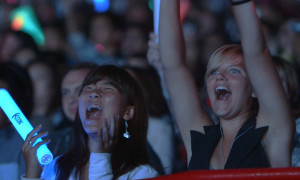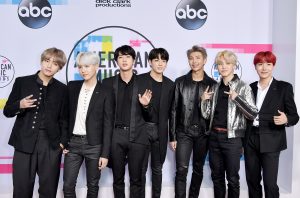 Ah, fan wars: an inevitable test of our fandom life. Fan wars are as old as K-pop time, White Angels vs Yellowskies, Sones vs Blackjacks, and now Exo-L vs Army. It seems each generation has its own great battle of animosity, some more vicious than others. In the current K-pop climate, fan wars have taken a more technological turn. What once began as a simple distraction from the stresses of everyday life in the form of YouTube videos and memes, has become a nearly full-time job of sub-tweeting, hashtagging, and voting — so much voting.
Ah, fan wars: an inevitable test of our fandom life. Fan wars are as old as K-pop time, White Angels vs Yellowskies, Sones vs Blackjacks, and now Exo-L vs Army. It seems each generation has its own great battle of animosity, some more vicious than others. In the current K-pop climate, fan wars have taken a more technological turn. What once began as a simple distraction from the stresses of everyday life in the form of YouTube videos and memes, has become a nearly full-time job of sub-tweeting, hashtagging, and voting — so much voting.
Fan wars are bred from the structure of K-pop itself: from the idea that we can only truly love one group, and that it is the responsibility of the fandom to protect said artists from any negative attacks. With tough competition, a copious amount of awards shows, and a media industry that feeds on the rivalry, tensions between fandoms are unavoidable. But the competition that media companies profit from would be nothing without the personal investment of fans. It’s as simple as this: we love something so much it becomes an extension of ourselves. We’re even given fandom names that make us part of a distinct group, an identity through which we bond. Thus, any success of the group we love feels like a personal success, and any slight feels like a personal attack.
 As our faves succeed, fandoms too become cockier, and more defensive of that success. There’s almost a need to maintain a group’s success through our own efforts as a means to repay the group for all the happiness they’ve brought us. And somewhere along the way, validating the success of the group becomes a way of self-validation: I’ve chosen to stan the right group. Fan wars are rarely about the groups themselves, but of the fandoms own pride and insecurities coming to head in the form of lashing out at one another.
As our faves succeed, fandoms too become cockier, and more defensive of that success. There’s almost a need to maintain a group’s success through our own efforts as a means to repay the group for all the happiness they’ve brought us. And somewhere along the way, validating the success of the group becomes a way of self-validation: I’ve chosen to stan the right group. Fan wars are rarely about the groups themselves, but of the fandoms own pride and insecurities coming to head in the form of lashing out at one another.
We know our faves and their rival groups don’t hate each other; any behind the scenes footage or awards show fancam will show us that. And yet, no matter how sane we may be as a fan, once a sense of competition begins to set in against another group, it spawns a nearly inescapable cycle of negativity and one-upping one another. It doesn’t help that K-pop fandom social media presence has garnered global attention, sparking a whole new level of competition as to which group gets to be acknowledged as the true global face of K-pop.
 We may have no legitimate qualms with a rival group, and no desire to hate them, but the bitterness of the fan war is potent, and any mention of a rival group’s success — or annoying action of a rival fandom — begins to plant seeds of resentment. Even worse, there are always fans who cross lines, who turn a simple rivalry into grounds for personal attacks and the spread of misinformation. As sane fans, we know this all deep down. We know it is only the actions of a few over-invested people with a limited vocabulary (yet surprising mastery of hashtags) that make a fandom look bad — but knowing that fan wars are pointless is not enough to stop us from reading the comments or replies just to work ourselves up, or adding a hashtag to our tweets just in case. There’s a morbid curiosity that comes with watching a fan war unfold and a lovely sense of vindication that comes with each small victory or negative comment.
We may have no legitimate qualms with a rival group, and no desire to hate them, but the bitterness of the fan war is potent, and any mention of a rival group’s success — or annoying action of a rival fandom — begins to plant seeds of resentment. Even worse, there are always fans who cross lines, who turn a simple rivalry into grounds for personal attacks and the spread of misinformation. As sane fans, we know this all deep down. We know it is only the actions of a few over-invested people with a limited vocabulary (yet surprising mastery of hashtags) that make a fandom look bad — but knowing that fan wars are pointless is not enough to stop us from reading the comments or replies just to work ourselves up, or adding a hashtag to our tweets just in case. There’s a morbid curiosity that comes with watching a fan war unfold and a lovely sense of vindication that comes with each small victory or negative comment.
We know this, we know this, and don’t inherently want to be a part of it. And still, asking why can’t we all get along? would be futile. Pulling up receipts on how the current fan war started would be even more pointless. So, instead, I’m proposing five quick and dirty tips to avoid falling into the abyss of mudslinging that social media helps perpetuate.
 1. Read a Fanfic.
1. Read a Fanfic.
It’s scientific fact that it’s impossible to devote energy to hating Jimin when Baekhyun and Chanyeol are busy fictionally getting it in. Fanfiction can give you just as good drama, angst, petty one-liners, and misspelled Korean words as any comments section — arguably with better prose. It’s a form of escapism, sure, but it’s also art made by fans who love the same things you do.
If you’re up for a challenge, read a crossover fic. Your fave, plus a rival group member? It’s enemies to lovers, only it’s your enemies, and your love[rs]. And who knows, you might walk away from the fic having a new appreciation for Suga‘s dirty mouth and RM‘s super smarts.
2. #Hashtag Smart.
Don’t fall into the trap of global media companies using our fandoms’ social media power as free advertising. The PyeongChang Olympics only highlighted how easy it is for a western media outlet to mention a K-pop act and go viral, journalists even tweeted about it. While we should all be proud of our social media presence, let’s not fall into hashtag battles for pointless awards that don’t matter. It’s tempting because deep down we want our faves to win all the awards, but just remember: these platforms are using us to sell tacos while going bankrupt, and we’re gaining nothing except getting Twitter jailed.
This is all a very eloquent way to say: if I see one more iHeartRadio hashtag on my timeline, I might implode.
3. Don’t Engage, Stay in Your Lane.
This goes hand in hand with suggestion #2. Just because our bias groups are mentioned in an article or tweet, does not mean we have to reply. A negative review does not warrant sliding into a journalist’s DMs to threaten them or putting someone on fandom blast simply because they’ve expressed a differing opinion. If every journalist only provided positive feedback, what good would it be? Critique is fine, and dialogue can be constructive when both sides approach it with an open mind.
Conversely, we should all do our best to not engage with tweets that aren’t about our group. While we all want to hype our faves to high heaven, someone who’s a fan of Joy‘s rainbow dress probably doesn’t need to hear about Black Pink‘s equally well-executed Gucci sponsorship. In the same vein, a celebratory post about 2PM performing at the Olympics doesn’t warrant a “but why not [redacted]” tweet. Which leads us to…
 4. Cheer Each Other On, FFS.
4. Cheer Each Other On, FFS.
BTS was on Ellen? Great! Exo performed at the Olympics? Also great! Just because one fandom achieves something cool, does not mean your faves are not also doing great things. There’s no need to tear down another fandom as a means to build yours up. It’s a classic case of Tall Poppy Syndrome, and it flatters no one.
As K-pop is gaining more Western attention, it’s easy to feel a sense of competition as to which group will be the next global representative. Here’s the thing: each success for one group is still a success for the genre as a whole. Yes, each group still has their own colors and strengths, but no set of talents makes one group more worthy than another of attention. Whatever our opinions may be about Western exposure and media attention, wanting it all for only one group is doing a disservice to every other groups’ hard work. Different groups will be afforded different opportunities, and it’s no fandom’s place to ask why it wasn’t their group instead.
Now, I’m not saying we have to love everything every group does, but fashioning hashtags like #StayLocal only makes us look hypocritical when a few months later we’re gloating about the honor of being part of the Dubai Fountain ceremony. Similarly, cutting down the honor of Exo and CL‘s Olympics performances will not change the fact that they were invited to perform, and BTS was unable to fit it into their schedule.
 5. Don’t Vote for the MAMAs.
5. Don’t Vote for the MAMAs.
Remember when award shows used to be a fun series of horrible camera work, faulty sound equipment, and red carpet outfits that looked like homecoming formal wear? Of course, there was still some nail-biting for the big awards, a little facing off on Tumblr or in comments sections, but for the most part award shows were a celebration of the year’s greatest hits. Back then, the most vicious battle was when Baby and Exo-l butted heads on social media only to get Busker Busker‘d, and within a few days the majority of both fandoms were laughing it off. Those were the days.
Even though everyone knows the MAMAs are a mess, Mnet finds a way to suck us in every year. Like most savvy media companies, they do this through social media: upping the anti (pun intended) with hashtag voting, and daily reminders that serve more as exposure for them than count as a real vote for your bias group. In reality, the awards are determined 50% by attendance, and 50% by whatever Mnet wants. The odds are never in our favor (especially if you’re a YG stan). So instead of getting caught up in making multiple accounts, and clogging T-lists with links to voting, vote once, know you’ve done your part, and leave it to Mnet to screw it up somehow.
All this is to say: fan rivalries are inescapable. The bias and emotions they stir are instinctual when something as personal as our favorite K-pop groups are attacked. As fans, we can acknowledge this without falling completely victim to it. We can also cheer on our faves without taking the bait of every shiny (but pointless) award dangled in front of us. Maybe we’ll never all get along — or deactivate our twitter accounts — but understanding the ways social media companies feed on fandom anxiety is a great first step to not giving a fork.
(Images via tvN, Mnet, ABC, SM Entertainment.)


